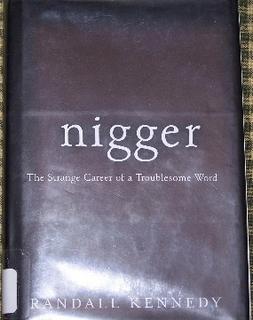A Few Words on - nigger: A Troublesome Word
 It's not very often that one comes across a totally fair and balanced yet excellent work of non-fiction. So naturally it's a matter of pleasure to lay one's hand on such a book by chance. I came across this book at the local Public Library, and had enough courage to ask the African American woman working there if I could get that book issued. she told me that the book was not yet processed, and then in a reply to if I could place a hold on it, she wrote down the name on a peace of paper and gave it to me, which I took to the white Librarian, and who, with the assistance of another African American guy who worked there, placed a hold for me. To me, the only matter of interest was its title that carries the single most offensive, taboo word in USA. I expected it to be a preachy, judgemental book. And was I wrong!
It's not very often that one comes across a totally fair and balanced yet excellent work of non-fiction. So naturally it's a matter of pleasure to lay one's hand on such a book by chance. I came across this book at the local Public Library, and had enough courage to ask the African American woman working there if I could get that book issued. she told me that the book was not yet processed, and then in a reply to if I could place a hold on it, she wrote down the name on a peace of paper and gave it to me, which I took to the white Librarian, and who, with the assistance of another African American guy who worked there, placed a hold for me. To me, the only matter of interest was its title that carries the single most offensive, taboo word in USA. I expected it to be a preachy, judgemental book. And was I wrong!This is one of the best books of non-fiction that I ever read in my life. To me, it's a privilege to have read this book. I now consider Randall Kennedy, a Professor at the Harvard Law School and author of this book, to be one of the most level-headed, analytical and balanced authors I'm familiar with. Below I reproduce two reviews from another source:
(Editorial Reviews: Amazon.com)
(From Publishers Weekly)
"The word is paradigmatically ugly, racist and inflammatory. But is it different when Ice Cube uses it in a song than when, during the O.J. Simpson trial, Mark Fuhrman was accused of saying it? What about when Lenny Bruce uses it to "defang" it by sheer repetition? Or when Mark Twain uses it in The Adventures of Huckleberry Finn to make an antiracist statement? Kennedy, a professor at Harvard Law School and noted legal scholar, has produced an insightful and highly provocative book that raises vital questions about the relationship between language, politics, social norms and how society and culture confront racism. Drawing on a wide range of historical, legal and cultural instances Harry S. Truman calling Adam Clayton Powell "that damned nigger preacher"; Title VII court cases in which the use of the word was proof of condoning a "racially hostile work environment"; Quentin Tarantino's liberal use of the word in his films Kennedy repeatedly shows not only the complicated cultural history of the word, but how its meaning, intent and even substance change in context. Smart, well argued and never afraid of facing serious, difficult and painful questions in an unflinching and unsentimental manner, this is an important work of cultural and political criticism. As Kennedy notes in closing: "For bad or for good, nigger is... destined to remain with us for the foreseeable future a reminder of the ironies and dilemmas, the tragedies and glories, of the American experience." (Jan. 22)Forecast: This may be the book that reignites larger debates over race eclipsed by September 11. Look for a bestselling run and huge talk show and magazine coverage as the Afghanistan news cycle continues to slow; the book had already been the subject of two New York Times stories by early January." (Copyright 2002 Cahners Business Information, Inc.)
_______________________________________________________________
Sources: Los Angeles Public Library
Pic Source: http://www.amazon.com
Quotes Source:
http://www.amazon.com/gp/product/0375713719/103-6252542-6423034?v=glance
&n=283155&n=507846&s=books&v=glance


0 Comments:
Post a Comment
<< Home